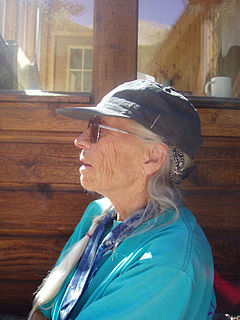A Quote by Aldo Leopold
All ethics so far evolved rest upon a single premise: that the individual is a member of a community of interdependent parts. . . The land ethic simply enlarges the boundaries of the community to include soils, waters, plants, and animals, or collectively: the land.
Related Quotes
My favorite quote: The land ethic simply enlarges the boundaries of the community to include soils, waters, plants, and animals, or collectively: the land. In short, a land ethic changes the role of Homo sapiens from conqueror of the land-community to plain member and citizen of it. It implies respect for his fellow-members, and also respect for the community as such.
The purpose of seasonal festivals is periodically to revive the topocosm. Gaster coined this word from the Greek - topo for place and cosmos for world order. Topocosm means "the world order of a particular place." The topocosm is the entire complex of any given locality conceived as a living organism, not just the human community but the total community - the plants, animals and soils of the place. The topocosm is not only the actual and present living community but also that continuous entity of which the present community is but the current manifestation.
When people, land, and community are as one, all three members prosper; when they relate not as members but as competing interests, all three are exploited. By consulting Nature as the source and measure of that membership, The Land Institute seeks to develop an agriculture that will save soil from being lost or poisoned while promoting a community life at once prosperous and enduring.
As I went walking I saw a sign there And on the sign it said "No Trespassing." But on the other side it didn't say nothing, That side was made for you and me. This land is your land, this land is my land From California to the New York island From the Redwood forest to the Gulf Stream waters This land was made for you and me.
Conservation is getting nowhere because it is incompatible with our Abrahamic concept of land. We abuse land because we regard it as a commodity belonging to us. When we see land as a community to which we belong, we may begin to use it with love and respect. There is no other way for land to survive the impact of mechanized man, nor for us to reap from it the aesthetic harvest it is capable, under science, of contributing to culture




























